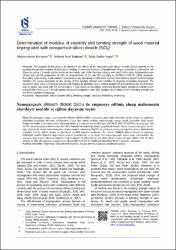Determination of modulus of elasticity and bending strength of wood material impregnated with nanoparticle silicon dioxide (SiO2)

Göster/
Erişim
Attribution 3.0 United Statesinfo:eu-repo/semantics/openAccesshttp://creativecommons.org/licenses/by/3.0/us/Tarih
2019Erişim
Attribution 3.0 United Statesinfo:eu-repo/semantics/openAccesshttp://creativecommons.org/licenses/by/3.0/us/Üst veri
Tüm öğe kaydını gösterÖzet
The purpose of this study is to determine the effects of the nano-particulate silicon dioxide (SiO2) material on the bending strength and modulus of elasticity in bending of some wood species. Oriental beech (Fagus orientalis L.) and sessile oak (Quercus petrea L.) woods species which are commonly used in the furniture industry were used in this study. Impregnation was carried out with the preparation of SiO2 at concentrations of 1% and 3% according to ASTM-D 1413-76 (1976) standards. According to the results, while solution concentration was increasing in both wood species, total retention (kg/m3) and percentage retention (%) values increased; air dry density (12%), bending strength and modulus of elasticity in bending decreased. The maximum mean values of bending strength and modulus of elasticity was in control samples of oriental beech and the minimum were in sessile oak wood with 3% concentration. These results can be related to the fact that the higher density of oriental beech wood (0.630-0.685 g/cm³). In both species of wood, impregnation with SiO2 resulted loss of about 3-5% in bending strength and 0.6-9% in modulus of elasticity. Bu çalışmanın amacı, nano tanecikli silisyum dioksit (SiO2) maddesinin bazı odun türlerinde eğilme direnci ve eğilmede elastikiyet modülüne etkilerini belirlemektir. Odun türü olarak mobilya endüstrisinde yaygın olarak kullanılan doğu kayını (Fagus orientalis L.) ve sapsız meşe (Quercus petrea L.) odunları tercih edilmiştir. ASTM-D 1413–76 (1976) esaslarına göre %1 ve %3 konsantrasyonlar hazırlanmış olan SiO2 maddesi ile emprenye işlemi gerçekleştirilmiştir. Deney sonuçlarına göre; her iki ağaç türünde de çözelti konsantrasyonu artarken toplam retensiyon (kg/m3) ve yüzdesel retensiyon değerleri artmış; hava kurusu yoğunluk (%12), eğilme direnci ve elastikiyet modülü değerleri azalmıştır. En yüksek ortalama eğilme direnci ve eğilmede elastikiyet modülü değerleri doğu kayını kontrol örneklerinde ve en düşük %3 konsantrasyonlu sapsız meşe odunundadır. Bu sonuçlar, doğu kayını odununun ağacının yoğunluğunun (0.630-0.685 g/cm³) daha yüksek olması ile ilgili olabilir. Her iki odun türünde de SiO2 ile emprenye uygulamaları eğilme direncini %3-5, elastikiyet modülünü %0.6-9 oranında azaltmıştır.
Cilt
20Sayı
1Koleksiyonlar
Aşağıdaki lisans dosyası bu öğe ile ilişkilidir:


















